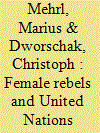| Srl | Item |
| 1 |
ID:
086002


|
|
|
|
|
| Publication |
2009.
|
| Summary/Abstract |
This article empirically examines how natural resources affect the severity of armed civil conflict. It finds that drug cultivation in the conflict area is associated with less severe conflicts but that gemstone mining and oil and gas in the conflict zone production increase the severity of conflicts. Most severe are secessionist conflicts in regions with hydrocarbon production. Interestingly, oil and gas production outside the conflict zones is related to less severe conflicts. Measured at the country level, none of the resource variables has an effect on conflict severity. These results have four implications. First, availability of natural resources affects the severity of armed civil conflict. Second, the location of resources is crucial to their impact on conflict. Third, the type of resource matters. Above all, it seems that natural resources affect conflict severity by altering incentives for both the rebel group and the state
|
|
|
|
|
|
|
|
|
|
|
|
|
|
|
|
| 2 |
ID:
188705


|
|
|
|
|
| Summary/Abstract |
How does the presence of female rebel combatants during conflict influence the likelihood of United Nations post-conflict peacekeeping deployment? While past literature on peacekeeping emphasizes the role of conflict attributes and security council interests, only few studies investigate the importance of belligerent characteristics. We argue that, because dominant gender stereotypes paint women as peaceful, female rebel combatants lead domestic and international audiences to perceive conflicts in which they fight as more severe. Given that recent UN resolutions and mission mandates align with these stereotypes, this in turn, causes the UN to intervene and deploy peacekeepers. Multivariate regression models drawing on a global sample of UN post-conflict missions provide empirical support for our hypothesis. Our findings add to the growing body of literature emphasizing the role of women in combat roles, and contribute to the discussion on the UN’s Women, Peace, and Security agenda.
|
|
|
|
|
|
|
|
|
|
|
|
|
|
|
|
| 3 |
ID:
193102


|
|
|
|
|
| Summary/Abstract |
The existing literature is unclear about whether private military and security companies (PMSCs) are a cause of increased conflict severity, or rather are simply hired within more severe conflicts. We argue that PMSCs do increase conflict severity, yet this is the result of an escalation strategy by states to regain territory from rebels. If contracted, PMSCs either substitute for host nation forces, or free up such conventional forces to engage in offensive operations. In both cases the conflict severity increases substantially. This argument is tested with OLS regression using data from 30 weak states from 1990 to 2007.
|
|
|
|
|
|
|
|
|
|
|
|
|
|
|
|